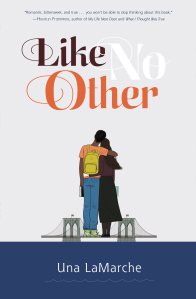 I was quite chuffed when I started to see Una LaMarche’s Like No Other appear on diverse reading lists. I was happy to say I had read the ARC and enjoyed it.
I was quite chuffed when I started to see Una LaMarche’s Like No Other appear on diverse reading lists. I was happy to say I had read the ARC and enjoyed it.
To get more background information for my review, I asked LaMarche a few questions about her book. Her answers were so interesting I thought I’d share it with y’all!
Both Devorah and Jaxon are from marginalized groups and not the typical protagonists in YA romance. What inspired you? How much research did you have to do for each character?
I was inspired by my neighborhood. I’ve lived in Brooklyn for most of my life, and was lucky enough to grow up in a fairly diverse community. Even though I’m white, it wasn’t nearly as hard to write the black character as it was to write the Hasidic character. That’s just a whole different world, full of rules, customs, and beliefs I had zero exposure to.
I did a lot of research for the character of Devorah. I knew so little about the Hasidic movement, it’s actually embarrassing to admit. When I started, I didn’t even know there were different sects within Hasidism! Luckily I found a few women, through an organization called Footsteps, that helps people leaving strict religious communities get acclimated to the secular world, who were willing to talk to me about their Hasidic upbringings. I learned so much, I really can’t overstate how invaluable their insight was. There would be no Devorah without them.
With Jaxon, I improvised a lot more. I didn’t want his race or background to define him in the same way that Devorah’s defined her; I wanted him to be more of a typical Brooklyn teen who the reader could instantly relate to.
Why did you choose to make Jaxon black, rather than any other race/ethnicity? What impact does that have on the narrative?
Even though I didn’t want Jaxon’s race to be a huge part of the story, I based Like No Other on Romeo & Juliet, and I wanted it to have a believably charged backstory. In 1991, there was an accident in which a car carrying the Hasidic rebbe (the sect’s religious leader) hit and killed a young black boy who was the son of Guyanese immigrants. This set off three days of rioting, and created a lot of animosity and distrust between the African-American and Hasidic populations of Crown Heights, who had lived side by side for decades. So, while in 2014 the two groups are certainly not sworn enemies, there is that Montague-Capulet blood feud aspect to it.
Family has a huge impact on these young people’s romance. What was your process in developing each family’s dynamic? How much research did you do as you developed their personalities and interactions?
Again, I did a lot more research into Devorah’s family dynamic because it’s so foreign to me. In the Hasidic world, men and women are very separate, and are subject to very different rules of conduct. There are elaborate guidelines for how they can and can’t interact with each other, so I had to familiarize myself with those laws.
Jaxon’s family was much more like the families I knew growing up—loud, warm, emotionally complex but fundamentally pretty nuclear.
What was the most challenging part of writing and editing this book? How was this book different from your previous work and how will it impact your future work?
The most challenging part of writing Like No Other was absolutely the research involved, and the fear of writing about people so different from me. It was especially hard—and this may expose a shallow side of my psyche—that Devorah couldn’t have pop culture references, because she’s not allowed to read secular books or watch movies or TV! I basically can’t exist without pop culture references. Thank God I had Jaxon to be my avatar on that front.
Like No Other could not be more different from my first novel, Five Summers. It’s funny, people always ask me if it’s a sequel and I have to be like, “No, I decided to go straight from four girls fighting over boys at summer camp to a racially- and religiously-charged urban romance.” Not to disparage Five Summers, but it’s just a much lighter book, dealing with more traditional YA themes like friendship and boys. Like No Other goes a lot deeper and is a lot more mature in many ways. And now that I’ve had a taste of how it feels to write something like that, honestly, I don’t think I can go back.


Join the conversation!